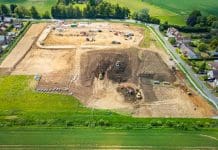Tamzin Caffrey, Head of Communications at EngineeringUK sheds light on what needs to be done to meet the future demand for engineers in the UK…
Britain is great at engineering and the industry continues to make a significant contribution to the economy as well as to our lives. At £1.17 trillion, it accounts for a quarter (24.9%) of UK turnover and continues to grow (latest figures put annual growth at 6.7%).
There are 5.4 million people employed in engineering in the UK, across a range of sectors, each with a vital contribution to make and each with its own challenges. Despite these strong employment numbers we still need more engineers. The projection is that engineering employers will need 1.82 million people likely to need engineering skills in the decade to 2022. Pro rata that’s 182,000 people a year which, at the current rate of supply, means we’re facing a shortfall of 55,000 per year (at technician level and above).
Research undertaken by the Centre for Economics and Business Research shows that filling the demand for new engineering jobs will generate an additional £27bn per year from 2022 for the UK economy. To give you an idea of what such a large figure means, that’s equivalent to building 1,800 schools or 110 hospitals. There is much to gain, but there is also much to do to reach the industry’s growth potential.
The number of students in science, technology, engineering and maths (STEM) is increasing but far too slowly. If we are to meet the needs of the industry we need to double the number of engineering apprentices and graduates entering the industry. We need to double the number of young people studying GCSE physics and we need more of them to continue to A level.
If we are to meet the future demand for engineers more needs to be done to inform and inspire young people and we want every 11-14 year old to have at least one engineering experience with an employer. This inspiration needs to highlight to young people and their parents the high value placed on STEM skills and promote the huge range of engineering careers available. There also needs to be more support for the teachers and advisors delivering careers information.
They need to understand the range of modern scientific, technological and engineering career paths, (including the diverse vocational/technician roles) so that in turn they can advise and inspire the young people who look to them for guidance. EngineeringUK runs 2 national programmes – The Big Bang and Tomorrow’s Engineers – to inspire more young people to consider a career in engineering and keep their options open.
Companies of all sizes across the UK spend time in schools promoting engineering to young people. The Tomorrow’s Engineers programme seeks to coordinate this outreach activity to boost overall reach and impact, and to engage and inspire more teenagers to continue with science and maths and consider an engineering career. Research shows this coordinated approach triples the impact of such outreach and with £27bn at stake we need to do everything we can to ensure the talent pipeline.
To support the companies and professional engineering institutions we are creating a heat map of engineering careers activities across the country through a national database that provides an accurate picture of what is happening locally. This heat map is driven by a powerful database that captures employer outreach activity. Many companies and organisations that are already working with schools are sharing data on that activity to give as comprehensive a picture as possible of current school coverage.
As this heat map develops, it will enable the identification of new opportunities and areas of duplication and work with local employers in the network to reach more schools more efficiently. We also have a network of employer support managers working at regional level to support engineering businesses committed to widening the talent pool and inspiring the next generation. It’s this coordinated local activity that has national impact and the programme has ambitions to reach 1 million young people annually within 5 years.
The Big Bang programme, which reaches children of all ages, aims to show just how many exciting and rewarding opportunities there are out there for them with the right experience and qualifications.
Through the national event (The Big Bang Fair) which happens in March every year, and through a series of regional and local events, we work with partner organisations across business and industry, government and academia to try and give a flavour of the real scale of engineering and science in the UK.
The Big Bang regional programme gives young people the opportunity to experience the Fair closer to home. In 2014 more than 82,000 students and teachers visited over 100 Near Me Fairs in their local area, which added to the 70,000 visitors to the national Fair, shows just how many young people can be reached when education, business and government work in collaboration.
Tamzin Caffrey
Head of Communications
EngineeringUK













